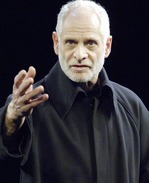SITE GUIDE
SEARCH
REVIEWS
REVIEW ARCHIVES
ADVERTISING AT CURTAINUP
FEATURES
NEWS
Etcetera and
Short Term Listings
LISTINGS
Broadway
Off-Broadway
NYC Restaurants
BOOKS and CDs
OTHER PLACES
Berkshires
London
California
New Jersey
Philadelphia
Elsewhere
QUOTES
TKTS
PLAYWRIGHTS' ALBUMS
LETTERS TO EDITOR
FILM
LINKS
MISCELLANEOUS
Free Updates
Masthead
A CurtainUp Review
The Grand Inquisito
|
. . .no later than tomorrow, at a sign from me, you will see that obedient flock run to heap up the hot cinders about the pile on which I shall burn you for coming to disturb us. For if anyone has deserved our fires, it is you..—
|

Bruce Myers in The Grand Inquisitor
(Photo: Geraint Lewis)
|
The subject matter holds great promise. Adapted from Dostoyevsky’s The Brothers Karamazov, the story revolves around the Spanish Inquisition. During its height in Seville, Christ returns to earth to protest. The Grand Inquisitor has him arrested and personally conducts his interrogation. What follows is a 55-minute monologue by Bruce Myers, who plays both the Narrator and the Inquisitor, about the philosophical nature of free will, the true intent behind Christ’s teaching, and how Christ actually deserves to be burnt alive along with the rest of the Inquisition’s victims.
Brook, who after many years with the Royal Shakespeare Company opened the International Centre for Theatre Research in Paris in 1971 has directed several groundbreaking productions (Lord of the Flies, Marat/Sade) as well as opera and film. His collaboration with actor Bruce Myers covers over 35 years. Brook’s expertise is very visible in the incredibly sparse staging of The Grand Inquisitor The set consists of a small playing square with two stools on an otherwise empty stage. There are no props, no sound effects, nothing to break the starkness. It takes a masterful director to work with such emptiness, in a play with only two characters, one of whom sits on a stool and does not speak. This is of course to be expected by anyone who has read his book The Empty Space (1968), which strips theatre down to the bare bones of performance — unlike earlier Brook works which were often weighty and complex ( the 1968 production of his Mahabharata was nine hours long, toured for four years, and involved dozens of actors).
The Grand Inquisitor is an excellent introduction to Brook’s style, a rare chance to see his work since he doesn’t direct new works very often. Bruce Myers’ performance is flawless. Though he has some odd transitions between narrating and performing, he handles them with aplomb and grace. But a 55-minute monologue, even one delivered by an impresario, can only be so active and exciting, especially since the role never really calls for any emotion or any sort of inner (or outer) revelation. It is essentially a long philosophical discourse that makes it difficult for the audience to find any way into the heart of the piece. There’s obviously no emotional connection with the Inquisitor and Christ is an entirely mute character. Granted It’s very well-written and executed but ultimately it's a purely intellectual exercise.
Editor's Note: When our London critic Charlotte Loveridge reviewed The Grand Inquisitor at the Barbican two years ago, it also featured Bruce Myers as the narrator but had a second actor to play Christ. However, her reaction was the same as Jenny's and she ended her review wonder how rapturously this production would have been received without the involvement of the iconic Peter Brook and weather its limited run in the Barbicvan's smallest venue did not make for a very much exclusive appeal. The London Review. Like the London production, this co-production by the New York Theatre Workshop, Theatre for a New Audience & Théâtre des Bouffes du Nordat has seeded enough of a buzz to extend the run by a week even before the official openingand 11/30/08
|
The Grand Inquisitor Adapted from Dostoyevsky’s The Brothers Karamazov by Marie-Helene Estienne Directed by Peter Brook With: Bruce Myers (Narrator) and Jake M. Smith (Christ) Lighting Design: Philippe Vialatte Running Time: 55 minutes with no intermission Co-presentation with Theatre for a New Audience & Théâtre des Bouffes du Nordat and NYTheatre Workshop New York Theatre Workshop, 79 East 4th Street, 212-239-6200 From 10/22/08; opening 10/29/08; closing 11/23/08--extended before official opening to 11/30/08 Tickets $75 Tuesday at 7 pm, Wednesday through Friday at 8 pm, Saturday at 2 pm and 8 pm, and Sunday at 3 pm and 7 pm October 22—November 30 Reviewed by Jenny Sandman based on October 25th performance |
|
REVIEW FEEDBACK Highlight one of the responses below and click "copy" or"CTRL+C"
Paste the highlighted text into the subject line (CTRL+ V): Feel free to add detailed comments in the body of the email. |






